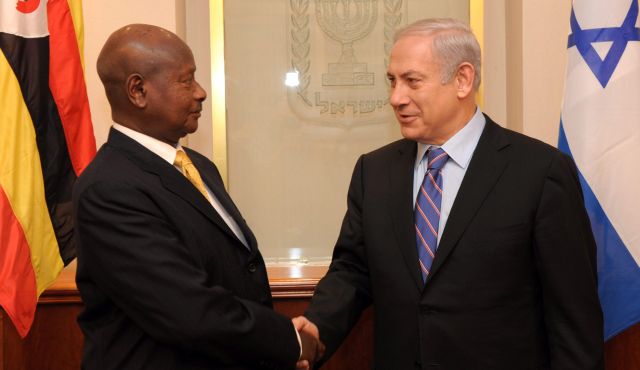Uganda’s political history is one that has been scarred by tumult and struggle. The notorious Idi Amin, who became known as the Butcher of Uganda (which makes me shudder) was the President of Uganda and military dictator from 1971 to 1979. During this time, Amin’s rule was marked by ethnic persecution, numerous human rights abuses, and untold corruption. Sadly, the exact death toll of Ugandan people during his reign is unknown. Some estimate it to be around 80,000, while others put it as high as 300,000.
Prior to Amin’s self-declaration of his presidency, Israel and Uganda had enjoyed a good relationship. In the late 1950s, Israel began to develop positive relationships with African countries. But in early 1960, they knew little of this country called Uganda. It wasn’t until later that year when the Ugandan leader Milton Obote came to visit Israel, by way of Austria, that the two countries began to foster their positive relationship. Obote spent a week in Israel, and met with many leading figures. However, after Obote departed, the Foreign Ministry of Israel received a startling telegram. Much to Israel’s surprise, the man they hosted was not the real Obote, but an imposter! Imagine everyone’s shock and embarrassment! Since Obote’s name, face, and reputation were relatively unknown in Israel, it was easy for this imposter to pull his ruse.
Fortunately, just two years later, Israel was able to host the real Obote. When Uganda gained its independence from Great Britain in 1962, Obote became the first prime minister of Uganda as an independent country. Israeli leaders began to devote a great amount of care to fostering a relationship with the African nation. Their number one interest was humanitarian- helping to develop the country. They also saw Uganda as an opportunity to gain support at the United Nations, and to break through the nearby encirclement of hostile Arab areas. Uganda gave Israel a spot close to nearby Sudan, which had openly participated in wars against the Jewish state. Obote welcomed Israel’s influence, since the Israelis had a strong reputation for military prowess and rapid economic development.
During the 1960s, Israel and Uganda cooperated on agriculture, industry, and education. Both public and private Israeli companies set to work in Uganda, building houses and airports, paving roads, and developing local clean water resources. Extensive cooperation in military endeavors also took place, and Israel supplied Uganda with arms. Hundreds of students from Uganda traveled to Israel in order to attend schools there. Both countries enjoyed a positive, flourishing relationship, and a steady increase in Israeli-Ugandan trade. However, all of this changed when Amin began his reign of terror. As many as 20,000 Ugandans fled the country in 1971, in an attempt to escape Amin’s dictatorship.
Israel was indeed surprised by Amin’s military coup. However, at first, during the period of time known as “The Honeymoon” in 1971, relations still appeared to be good between the two countries, and Israel announced that it would not interfere with Uganda’s internal affairs. Soon thereafter, Amin began to show his true colors, and announced that he was suspending certain conditions of the Ugandan constitution. He implemented a series of changes to Ugandan law and institutions in order to easily carry out military discipline, torture, and executions. Amin asked Israel for a loan of ten million pounds sterling, which Israel refused.
In 1972, Amin declared an “economic war” and expropriated all property belonging to Europeans and Asians. At this time, he also cut off all relations with Israel. He expelled the military advisors from Israel, and became an outspoken critic against the State of Israel, and even planned war against them. At this time, Amin aligned himself with Arab anti-Israeli propaganda and began to make anti-Semitic statements publicly.
This break in Israeli-Ugandan relations lasted a full 22 years. Ties were renewed in July 1994 by Ugandan President Yoweri Museveni. At this time, he signed an agreement to resume diplomatic relations between the two countries. Since 1994, political and economic relations between the two countries have grown. Although for many years it seemed that one man’s terrible influence and horrible actions may have spoiled the relationship, Israel and Uganda have worked to reestablish ties, and today Uganda is just one of many African nations with which Israel enjoys a friendly relationship.




